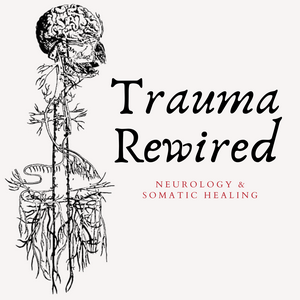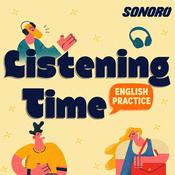272 episodes
- For many people with a history of chronic stress, attachment wounds, or complex trauma, boundaries don't land as neutral information — they register in the nervous system as abandonment, threat, or loss of connection. In this episode of Trauma Rewired, we explore why that happens and what it actually takes to rewire those responses at the level that matters most: the body.
This conversation reframes boundaries not as walls, ultimatums, or communication strategies, but as a nervous system skill that emerges from regulation, capacity, and internal coherence. Together with our guest, we unpack why setting boundaries from anger can feel easier than setting them from truth, why receiving boundaries can activate shame or collapse, and how post-traumatic growth allows boundaries to become a source of safety rather than disconnection.
If you've ever understood boundaries intellectually but struggled to live them relationally, this episode offers a deeper, more compassionate lens — one rooted in neuroscience, somatics, and the lived process of healing.
In this episode of Trauma Rewired, co-hosts Jennifer Wallace and Elisabeth Kristof are joined by Margy Feldhuhn, co-owner of Brain-Based Wellness, for a grounded, practical conversation about boundaries.
The conversation addresses why boundaries can feel threatening for people with relational or developmental trauma, how control dynamics get confused with protection, and what it looks like to set limits without shame, punishment, or power struggles. Whether you struggle to set boundaries, feel triggered by others' boundaries, or worry about being "too much," this episode offers language and perspective that supports safety rather than disconnection.
Chapters
00:00 – Intro/Why boundaries often get mislabeled as control
07:42 – Trauma, power, and the nervous system's role in boundaries
15:30 – The difference between protective limits and coercion
24:10 – Why boundaries can feel unsafe or activating
33:45 – Common boundary mistakes rooted in trauma responses
44:20 – What healthy, non-controlling boundaries actually look like
Calls to Action
👉Join us for a free NSI workshop Feb 11: Integrating the Nervous System with Precision and Purpose: https://neurosomaticintelligence.com/integration-workshop/
👉Learn to work with Boundaries at the level of the body and nervous system at https://www.boundaryrewire.com
👉Get a two-week free trial of neurosomatic training at https://rewiretrial.com
Research Resources:
Taylor, S. E. et al. (2000) Biobehavioral responses to stress in females: Tend-and-befriend, not fight-or-flight. Psychological Review, 107(3), 411–429. https://doi.org/10.1037/0033-295X.107.3.411
Taylor, S. E. et al. (2011) Tend and Befriend: Biobehavioral Bases of Affiliation Under Stress.Current Directions in Psychological Science, 20(6), 357–362. https://journals.sagepub.com/doi/10.1177/0963721411429454
Heinrichs, M. et al. (2003) Social support and oxytocin interact to suppress cortisol and subjective responses to psychosocial stress. Biological Psychiatry, 54(12), 1389–1398. https://doi.org/10.1016/S0006-3223(03)00465-7
Carter, C. S. (2014) Oxytocin pathways and the evolution of human behavior. Annual Review of Psychology, 65, 17–39. https://doi.org/10.1146/annurev-psych-010213-115110
Disclaimer:
Trauma Rewired podcast is intended to educate and inform but does not constitute medical, psychological or other professional advice or services. Always consult a qualified medical professional about your specific circumstances before making any decisions based on what you hear. We share our experiences, explore trauma, physical reactions, mental health and disease. If you become distressed by our content, please stop listening and seek professional support when needed. Do not continue to listen if the conversations are having a negative impact on your health and well-being. If you or someone you know is struggling with their mental health, or in mental health crisis and you are in the United States you can 988 Suicide and Crisis Lifeline.
If someone's life is in danger, immediately call 911.
We do our best to stay current in research, but older episodes are always available. We don't warrant or guarantee that this podcast contains complete, accurate or up-to-date information. It's very important to talk to a medical professional about your individual needs, as we aren't responsible for any actions you take based on the information you hear in this podcast.
We invite guests onto the podcast. Please note that we don't verify the accuracy of their statements. Our organization does not endorse third-party content and the views of our guests do not necessarily represent the views of our organization. We talk about general neuro-science and nervous system health, but you are unique. These are conversations for a wide audience. They are general recommendations and you are always advised to seek personal care for your unique outputs, trauma and needs.
We are not doctors or licensed medical professionals. We are certified neuro-somatic practitioners and nervous system health/embodiment coaches. We are not your doctor or medical professional and do not know you and your unique nervous system. This podcast is not a replacement for working with a professional. The BrainBased.com site and RewireTrial.com is a membership site for general nervous system health, somatic processing and stress processing. It is not a substitute for medical care or the appropriate solution for anyone in a mental health crisis.
Any examples mentioned in this podcast are for illustration purposes only. If they are based on real events, names have been changed to protect the identities of those involved.
We've done our best to ensure our podcast respects the intellectual property rights of others, however if you have an issue with our content, please let us know by emailing us at [email protected].
All rights in our content are reserved. - In this episode of Trauma Rewired, we explore autoimmune conditions through a nervous-system and psychoneuroimmunology lens—moving beyond the idea that the body is "attacking itself." Instead, we examine autoimmunity as an adaptive output of a system that has lived in chronic threat for too long.
Jennifer Wallace and Elisabeth Kristof unpack how immune response, emotional expression, boundaries, trauma history, and social stress intersect at the level of physiology. Drawing on research from ACEs, chronic inflammation, the HPA axis, the inflammatory reflex, and shame-based immune activation, they explain how the brain's predictions—rather than isolated biology—shape immune behavior.
You'll hear why autoimmune conditions disproportionately affect women and marginalized communities, how emotional suppression and boundary violations translate into inflammation, and why anger, shame, and safety are biological—not just psychological—processes. The episode closes with a grounded conversation on post-traumatic growth: what it means to live in partnership with the body, retrain predictions through sensory and interoceptive work, and expand resilience alongside medical care. This is an invitation to replace self-blame with curiosity—and to see regulation, expression, and safety as central to immune health.
Timestamps
00:00 – Intro: Autoimmune as protection, not self-attack
08:40 – Autoimmune, ACEs, gender, and nervous system prediction
21:05 – Chronic inflammation, HPA axis & the inflammatory reflex
35:20 – Boundaries, anger, shame & post-traumatic growth
52:00 – Closing reflections & integration
Key Takeaways
Autoimmune responses can be understood as nervous-system outputs shaped by prediction and chronic threat.
Early adversity, emotional suppression, and social stress significantly increase inflammatory load.
Boundaries are physiological capacities rooted in interoception and proprioception—not just communication skills.
Training safety, expression, and regulation can complement medical care and reduce flare frequency.
Call to Action:
Join us for a free NSI workshop Feb 11: Integrating the Nervous System with Precision and Purpose: https://neurosomaticintelligence.com/integration-workshop/
Learn to work with Boundaries at the level of the body and nervous system at boundaryrewire.com
Sacred Synapse: an educational YouTube channel founded by Jennifer Wallace that explores nervous system regulation, applied neuroscience, consciousness, and psychedelic preparation and integration through Neurosomatic Intelligence.
Wayfinder Journal: Track nervous system patterns and support preparation and integration through Neurosomatic Intelligence.
FREE 1 Year Supply of Vitamin D + 5 Travel Packs from Athletic Greens when you use my exclusive offer: https://www.drinkag1.com/rewired
Get a two-week free trial of neurosomatic training at rewiretrial.com
Resources Mentioned
NIH – Autoimmune Diseases & Women: https://orwh.od.nih.gov/research/maternal-morbidity-mortality/autoimmune-diseases
Danese & Lewis (2017) Psychoneuroimmunology of Early-Life Stress: https://pubmed.ncbi.nlm.nih.gov/27860545/
Dube et al. (2009) ACEs & Autoimmune Risk: https://pubmed.ncbi.nlm.nih.gov/19234146/
McEwen & Gianaros (2016) Stress, Brain & Disease: https://pubmed.ncbi.nlm.nih.gov/26766224/
Dickerson & Kemeny (2004) Shame, Social Threat & Inflammation: https://pubmed.ncbi.nlm.nih.gov/15250837/
Disclaimer:
Trauma Rewired podcast is intended to educate and inform but does not constitute medical, psychological or other professional advice or services. Always consult a qualified medical professional about your specific circumstances before making any decisions based on what you hear. We share our experiences, explore trauma, physical reactions, mental health and disease. If you become distressed by our content, please stop listening and seek professional support when needed. Do not continue to listen if the conversations are having a negative impact on your health and well-being. If you or someone you know is struggling with their mental health, or in mental health crisis and you are in the United States you can 988 Suicide and Crisis Lifeline.
If someone's life is in danger, immediately call 911.
We do our best to stay current in research, but older episodes are always available. We don't warrant or guarantee that this podcast contains complete, accurate or up-to-date information. It's very important to talk to a medical professional about your individual needs, as we aren't responsible for any actions you take based on the information you hear in this podcast.
We invite guests onto the podcast. Please note that we don't verify the accuracy of their statements. Our organization does not endorse third-party content and the views of our guests do not necessarily represent the views of our organization. We talk about general neuro-science and nervous system health, but you are unique. These are conversations for a wide audience. They are general recommendations and you are always advised to seek personal care for your unique outputs, trauma and needs.
We are not doctors or licensed medical professionals. We are certified neuro-somatic practitioners and nervous system health/embodiment coaches. We are not your doctor or medical professional and do not know you and your unique nervous system. This podcast is not a replacement for working with a professional. The BrainBased.com site and RewireTrial.com is a membership site for general nervous system health, somatic processing and stress processing. It is not a substitute for medical care or the appropriate solution for anyone in mental health crisis.
Any examples mentioned in this podcast are for illustration purposes only. If they are based on real events, names have been changed to protect the identities of those involved.
We've done our best to ensure our podcast respects the intellectual property rights of others, however if you have an issue with our content, please let us know by emailing us at [email protected].
All rights in our content are reserved. - Have you ever shared an idea, been met with silence, and felt your body instantly brace like something was wrong? Or walked to your car and suddenly felt flooded by an old fear, even though nothing "new" happened? In this episode, we explore how trauma and chronic stress can shift the brain from learning mode into survival mode, shaping what we remember, how we recall it, and how safe it feels to stay curious. You will hear why memory is not a perfect recording, how present-day state influences recall, and how the nervous system can tag even subtle cues, like a pause or a tone, as danger when past experiences taught your body that silence equals disconnection.
In this episode of Trauma Rewired, co-hosts Elisabeth Kristof (founder of BrainBased.com and the Neurosomatic Intelligence Coaching Certification) and Jennifer Wallace (Neurosomatic Psychedelic Preparation and Integration Guide) are joined by Matt Bush, founder of Next Level Neuro and lead educator in the NSI certification. Together, they unpack explicit vs. implicit memory, how the hippocampus, amygdala, and prefrontal cortex influence recall and learning, and how regulation, sensory inputs, and repetition can support integration and post-traumatic growth.
Timestamps:
00:00 A real-life trigger: when silence, social cues, or context flips the body into survival
08:00 Memory basics: explicit vs. implicit, plus episodic, semantic, emotional, and procedural memory
16:00 Why memory is reconstructive: state, prediction, and sensory integration shape recall
24:00 Trauma + memory: hippocampus, amygdala, and why facts fade while sensations intensify
33:00 Learning after trauma: attention as a nervous system state, and why willpower is not the lever
42:00 Memory reconsolidation and "windows" for updating threat charge with regulation
55:00 Psychedelics, preparation, and nervous system training: capacity, safety, and integration
1:07:00 Motivation, dopamine pathways, and rebuilding curiosity through safe repetition
1:18:00 Closing reframes: contraction and expansion, neurodiversity, and reducing sensory "noise"
Key Takeaways:
Trauma can disrupt how memories are stored and recalled, especially under high stress, without it being a personal failure.
Memory is reconstructive, and your current nervous system state can change how both positive and negative memories feel.
Learning is embodied: attention, curiosity, and motivation depend on safety signals in the body, not just mindset.
Regulation plus recall can create opportunities to update threat charge and build new predictions over time.
Repetition is not just practice. It is consistent exposure to safety while doing something new.
Resources Mentioned:
Free live 90-minute workshop: Neurosomatic.com/Integration
NSI Community: Neurosomatic.com
BrainBased: BrainBased.com
Next Level Neuro: Nextlevelneuro.com
Sacred Synapse: an educational YouTube channel founded by Jennifer Wallace that explores nervous system regulation, applied neuroscience, consciousness, and psychedelic preparation and integration through Neurosomatic Intelligence.
Wayfinder Journal: Track nervous system patterns and support preparation and integration through Neurosomatic Intelligence.
FREE 1 Year Supply of Vitamin D + 5 Travel Packs from Athletic Greens when you use my exclusive offer: https://www.drinkag1.com/rewired
Call to Action:
Subscribe on your favorite audio platform or join us on YouTube!
👉 For a deeper understanding of integration, join our free live 90-minute Integration Workshop on February 11, 2026, at 12 PM CT. This experiential training covers how the nervous system processes change and how to integrate it effectively.
https://neurosomaticintelligence.com/integration/
👉 You can also continue learning tools for nervous system regulation and post-traumatic growth at rewiretrial.com
Disclaimer:
Trauma Rewired podcast is intended to educate and inform but does not constitute medical, psychological or other professional advice or services. Always consult a qualified medical professional about your specific circumstances before making any decisions based on what you hear. We share our experiences, explore trauma, physical reactions, mental health and disease. If you become distressed by our content, please stop listening and seek professional support when needed. Do not continue to listen if the conversations are having a negative impact on your health and well-being. If you or someone you know is struggling with their mental health, or in mental health crisis and you are in the United States you can 988 Suicide and Crisis Lifeline.
If someone's life is in danger, immediately call 911.
We do our best to stay current in research, but older episodes are always available. We don't warrant or guarantee that this podcast contains complete, accurate or up-to-date information. It's very important to talk to a medical professional about your individual needs, as we aren't responsible for any actions you take based on the information you hear in this podcast.
We invite guests onto the podcast. Please note that we don't verify the accuracy of their statements. Our organization does not endorse third-party content and the views of our guests do not necessarily represent the views of our organization. We talk about general neuro-science and nervous system health, but you are unique. These are conversations for a wide audience. They are general recommendations and you are always advised to seek personal care for your unique outputs, trauma and needs.
We are not doctors or licensed medical professionals. We are certified neuro-somatic practitioners and nervous system health/embodiment coaches. We are not your doctor or medical professional and do not know you and your unique nervous system. This podcast is not a replacement for working with a professional. The BrainBased.com site and RewireTrial.com is a membership site for general nervous system health, somatic processing and stress processing. It is not a substitute for medical care or the appropriate solution for anyone in mental health crisis.
Any examples mentioned in this podcast are for illustration purposes only. If they are based on real events, names have been changed to protect the identities of those involved.
We've done our best to ensure our podcast respects the intellectual property rights of others, however if you have an issue with our content, please let us know by emailing us at [email protected].
All rights in our content are reserved. - Have you ever felt like you have done everything "right" and you still hit a stress ceiling? You have gone to therapy, set boundaries, practiced self-care, learned regulation, and yet you still find yourself snapping, shutting down, or running on empty. This episode explores what it can look like to move beyond coping and into true emotional capacity. Not a life without stress, but a wider internal ability to meet life as it is, without collapsing into burnout or disconnection.
In this episode of Trauma Rewired, co-hosts Elisabeth Kristof (founder of BrainBased.com and the Neurosomatic Intelligence Coaching Certification) and Jennifer Wallace (Neurosomatic Psychedelic Preparation and Integration Guide, founder of Sacred Synapse) are joined by RaQuel Hopkins, a therapist and certified coach known for her work on capacity and adult development. Together, they unpack the difference between resilience, distress tolerance, and capacity, why "regulation" can sometimes become suppression, and how relating to emotions as data can create more choice. They also explore boundaries through the lens of self-trust, and why honoring "I do not want to" can be a meaningful step toward recovery and growth.
Timestamps:
00:00 – Why "doing everything right" can still feel like a ceiling
06:30 – What capacity means (and why it is about who you become)
14:30 – Resilience vs distress tolerance vs capacity
23:30 – Emotional strength, fragility, and the regulation misconception
34:30 – Boundaries, self-trust, and choice vs depletion
46:30 – Protective emotions, curiosity, and integration
56:30 – Corporate environments, pressure, and being human at work
1:03:00 – Closing reflections and where to find RaQuel
1:05:30 – Listener invitation and next steps (trial + workshop)
Key Takeaways:
Capacity is not just "holding more." It can be about meeting life as it is and adapting without losing yourself.
Regulation is not the same thing as calm. It is about modulation and appropriate responsiveness.
Emotional strength includes feeling emotions without being defined by them. Emotions can be information, not directives.
A "hard no" can sometimes be a signal of depletion, not clarity. Self-trust can reduce the need to announce boundaries.
Protective patterns once helped you survive. Growth can start with curiosity rather than judgment.
Resources Mentioned:
Free live 90-minute workshop: Neurosomatic.com/Integration
NSI Community: Neurosomatic.com
BrainBased: BrainBased.com
Sacred Synapse: an educational YouTube channel founded by Jennifer Wallace that explores nervous system regulation, applied neuroscience, consciousness, and psychedelic preparation and integration through Neurosomatic Intelligence.
Wayfinder Journal: Track nervous system patterns and support preparation and integration through Neurosomatic Intelligence.
FREE 1 Year Supply of Vitamin D + 5 Travel Packs from Athletic Greens when you use my exclusive offer: https://www.drinkag1.com/rewired
Call to Action:
Subscribe on your favorite audio platform or join us on YouTube!
👉 For a deeper understanding of integration, join our free live 90-minute Integration Workshop on February 11, 2026, at 12 PM CT. This experiential training covers how the nervous system processes change and how to integrate it effectively.
https://neurosomaticintelligence.com/integration/
👉 You can also continue learning tools for nervous system regulation and post-traumatic growth at rewiretrial.com
Disclaimer:
Trauma Rewired podcast is intended to educate and inform but does not constitute medical, psychological or other professional advice or services. Always consult a qualified medical professional about your specific circumstances before making any decisions based on what you hear. We share our experiences, explore trauma, physical reactions, mental health and disease. If you become distressed by our content, please stop listening and seek professional support when needed. Do not continue to listen if the conversations are having a negative impact on your health and well-being. If you or someone you know is struggling with their mental health, or in mental health crisis and you are in the United States you can 988 Suicide and Crisis Lifeline.
If someone's life is in danger, immediately call 911.
We do our best to stay current in research, but older episodes are always available. We don't warrant or guarantee that this podcast contains complete, accurate or up-to-date information. It's very important to talk to a medical professional about your individual needs, as we aren't responsible for any actions you take based on the information you hear in this podcast.
We invite guests onto the podcast. Please note that we don't verify the accuracy of their statements. Our organization does not endorse third-party content and the views of our guests do not necessarily represent the views of our organization. We talk about general neuro-science and nervous system health, but you are unique. These are conversations for a wide audience. They are general recommendations and you are always advised to seek personal care for your unique outputs, trauma and needs.
We are not doctors or licensed medical professionals. We are certified neuro-somatic practitioners and nervous system health/embodiment coaches. We are not your doctor or medical professional and do not know you and your unique nervous system. This podcast is not a replacement for working with a professional. The BrainBased.com site and RewireTrial.com is a membership site for general nervous system health, somatic processing and stress processing. It is not a substitute for medical care or the appropriate solution for anyone in mental health crisis.
Any examples mentioned in this podcast are for illustration purposes only. If they are based on real events, names have been changed to protect the identities of those involved.
We've done our best to ensure our podcast respects the intellectual property rights of others, however if you have an issue with our content, please let us know by emailing us at [email protected].
All rights in our content are reserved. - What if the places we have been hurt most, our relationships, can also become the places where we grow? In this episode, we explore relational healing as a powerful driver of post-traumatic growth. Together, we unpack why safe connection can feel threatening after complex trauma, how protective patterns like fight, freeze, and fawn are intelligent adaptations (not personal failures), and why "capacity" is less about willpower and more about what your nervous system can hold in real time. You will hear how micro-moments of self attunement can reduce hypervigilance, build trust from the inside out, and turn insight into embodied change.
In this episode of Trauma Rewired, co-hosts Elisabeth Kristof (founder of BrainBased.com and the Neurosomatic Intelligence Coaching Certification) and Jennifer Wallace (Neurosomatic Psychedelic Preparation and Integration Guide) are joined by Piper Rose, a Neurosomatic Relationship Coach, founder of Shadowplay Coaching, and Director of Operations and Continuing Education at NSI. Piper shares an honest, grounded look at how co-regulation, repair, and "the burden of love" can become a training ground for deeper intimacy, resilience, and self compassion.
Timestamps:
00:00 Intro: Why healing is relational, not just individual
03:30 Meet Piper Rose and what "Neurosomatic Relationship Coaching" means
08:20 Trauma, attachment wounding, and protective F responses in relationships
16:10 Reframing patterns as adaptations, not defects, and finding the "gifts" inside them
22:40 Neuroscience of connection: co-regulation, threat prediction, and updating the model
31:30 Why safe relationships can trigger fear, emotional flashbacks, and vulnerability
41:10 Self attunement, needs, and practicing repair in micro-moments
49:20 Community, nature, and animals as lower-risk pathways to relational practice
56:30 Closing reflections: building trust, capacity, and support beyond one relationship
Key Takeaways:
Relational patterns like fight, freeze, and fawn are often strategic survival adaptations, not signs you are "broken."
Safe connection can feel dangerous when your nervous system is trained to predict harm in intimacy.
"Capacity" is not just skill or knowledge. It is whether your body can access those skills under pressure.
Self attunement, like responding to thirst, overwhelm, or startle, builds a foundation for secure internal attachment and clearer boundaries.
You do not have to do relational healing alone. Support teams, community, nature, and animals can provide safe enough co-regulation while you build trust.
Resources Mentioned:
Free live 90-minute workshop: Neurosomatic.com/Integration
NSI Community: Neurosomatic.com
BrainBased: BrainBased.com
Sacred Synapse: an educational YouTube channel founded by Jennifer Wallace that explores nervous system regulation, applied neuroscience, consciousness, and psychedelic preparation and integration through Neurosomatic Intelligence.
Wayfinder Journal: Track nervous system patterns and support preparation and integration through Neurosomatic Intelligence.
FREE 1 Year Supply of Vitamin D + 5 Travel Packs from Athletic Greens when you use my exclusive offer: https://www.drinkag1.com/rewired
Cozolino, L. J. (2014). The Neuroscience of Human Relationships: Attachment and the Developing Social Brain (2nd ed.). W. W. Norton & Company
Call to Action:
Subscribe on your favorite audio platform or join us on YouTube!
👉 For a deeper understanding of integration, join our free live 90-minute Integration Workshop on February 11, 2026, at 12 PM CT. This experiential training covers how the nervous system processes change and how to integrate it effectively.
https://neurosomaticintelligence.com/integration/
👉 You can also continue learning tools for nervous system regulation and post-traumatic growth at rewiretrial.com
Disclaimer:
Trauma Rewired podcast is intended to educate and inform but does not constitute medical, psychological or other professional advice or services. Always consult a qualified medical professional about your specific circumstances before making any decisions based on what you hear. We share our experiences, explore trauma, physical reactions, mental health and disease. If you become distressed by our content, please stop listening and seek professional support when needed. Do not continue to listen if the conversations are having a negative impact on your health and well-being. If you or someone you know is struggling with their mental health, or in mental health crisis and you are in the United States you can 988 Suicide and Crisis Lifeline.
If someone's life is in danger, immediately call 911.
We do our best to stay current in research, but older episodes are always available. We don't warrant or guarantee that this podcast contains complete, accurate or up-to-date information. It's very important to talk to a medical professional about your individual needs, as we aren't responsible for any actions you take based on the information you hear in this podcast.
We invite guests onto the podcast. Please note that we don't verify the accuracy of their statements. Our organization does not endorse third-party content and the views of our guests do not necessarily represent the views of our organization. We talk about general neuro-science and nervous system health, but you are unique. These are conversations for a wide audience. They are general recommendations and you are always advised to seek personal care for your unique outputs, trauma and needs.
We are not doctors or licensed medical professionals. We are certified neuro-somatic practitioners and nervous system health/embodiment coaches. We are not your doctor or medical professional and do not know you and your unique nervous system. This podcast is not a replacement for working with a professional. The BrainBased.com site and RewireTrial.com is a membership site for general nervous system health, somatic processing and stress processing. It is not a substitute for medical care or the appropriate solution for anyone in mental health crisis.
Any examples mentioned in this podcast are for illustration purposes only. If they are based on real events, names have been changed to protect the identities of those involved.
We've done our best to ensure our podcast respects the intellectual property rights of others, however if you have an issue with our content, please let us know by emailing us at [email protected].
All rights in our content are reserved.
More Education podcasts
Trending Education podcasts
About Trauma Rewired
The Podcast that teaches you about your nervous system, how trauma gets stored in the body and what you can do to heal.
Podcast websiteListen to Trauma Rewired, The Divorce Course Podcast and many other podcasts from around the world with the radio.net app

Get the free radio.net app
- Stations and podcasts to bookmark
- Stream via Wi-Fi or Bluetooth
- Supports Carplay & Android Auto
- Many other app features
Get the free radio.net app
- Stations and podcasts to bookmark
- Stream via Wi-Fi or Bluetooth
- Supports Carplay & Android Auto
- Many other app features


Trauma Rewired
Scan code,
download the app,
start listening.
download the app,
start listening.































